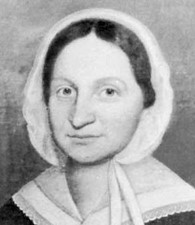Mary Lyon was a progressive educator and pioneer of women’s higher education. In 1837 she founded the Mount Holyoke Female Seminary in South Hadley, Massachusetts, and spent her life dedicated to advancing the education of women.
Early Days
Mary Lyon was born in Massachusetts on February 28, 1797. Her father, Aaron, died when she was 5, leaving his wife, Jemina, to raise seven children and run a 100-acre farm alone. By the time Mary was 13, Jemina remarried and moved to her new husband’s home. Mary was left behind, keeping house for her brother, who ran the farm. Her brother paid her a silver dollar a week for her work.
When Lyon was young, girls in some Massachusetts towns were only allowed to attend school during the summer months, when boys did farm work at home. During the winter, they had to sit on the school steps, trying to hear what they could of the teacher’s lessons.
Still, Lyon proved to be a good student, becoming a teacher at 17. She used teaching to finance her own education, but doing so was a challenge. Her struggles only served to make Lyon more determined to provide better educational opportunities for other women. Lyon hoped to create an institution that had strong financial backing and would prepare women to become more than homemakers or teachers. She envisioned women of all economic classes receiving the benefit of such an education, which would be the equivalent to that of men.
Sources in this Story
- Mount Holyoke: Mary Lyon
- National Women’s Hall of Fame: Mary Lyon
- National Register of Historic Places: Places Where Women Made History
- Encyclopedia Britannica: Mary Lyon
- Time: Breaking the Daisy Chain
- National Women’s History Museum: Mary Mason Lyon
Notable Accomplishments
When Lyon finished her own schooling, she began teaching other young women in their homes while searching for a suitable classroom. Major Joseph Griswold, a prominent citizen with a large home, gave Lyon use of his third floor ballroom to hold her classes. Lyon taught lessons in Latin, science and history, which set her apart from other educators, as women were generally taught painting, needlework and music.
As Lyon’s “reputation as a progressive educator” grew in Massachusetts, the town of South Hadley gave her $8,000 to create a women’s “seminary.” In 1837, Mount Holyoke Female Seminary opened in South Hadley, Massachusetts, with Lyon as its principal. The school started with approximately 80 students, and quickly became a big success. By 1838 about 400 applicants were turned away from the school because there wasn’t enough room. Lyon led the school for 12 years, and during that time, the curriculum grew and new buildings were constructed.
Lyon published “A Missionary Offering” in 1843. By 1895, her school became Mount Holyoke College, a leading educational institution for women.
The Woman and Her Work
- “The Power Of Christian Benevolence: Illustrated In The Life And Labors Of Mary Lyon” by Edward Hitchcock
- “Mary Lyon: Documents and Writings” by James E. Hartley
- “The Life of Mary Lyon” by Beth Bradford Gilchrist
The Rest of the Story
Decades after Mount Holyoke was founded, six other educational institutions for women—Smith, Vassar, Wellesley, Bryn Mawr, Radcliffe and Barnard—joined ranks with Lyon’s school to become the “Seven Sisters.” Primarily, they worked together to improve fundraising efforts. Lyon once called her school a “peculiar institution.” Each school bore the same nickname.
Years of hard work at Mount Holyoke and the stresses of losing a nephew to suicide began taking their toll on Lyon. She suffered from severe headaches, and died in her apartment at Mount Holyoke in 1849 at the age of 52; Lyon’s grave is still part of the campus grounds. By 1851, Edward Hitchcock had published a book in honor of her achievements: “The Power of Christian Benevolence: The Life of Mary Lyon.”
This article was originally written by Lindsey Chapman; it was updated January 10, 2017.











